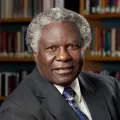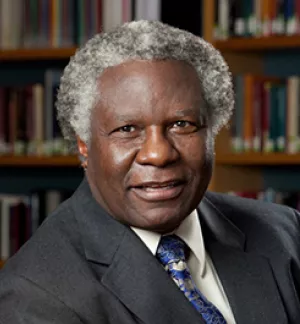Note
China's Ministry of Science and Technology launched the China-Africa Science and Technology Partnership on November 24, 2009. The ministry announced that technological cooperation will be enhanced in areas such as water management and conservation, sanitation, crop breeding, health, and renewable energy. One hundred joint research partnerships will be created, and 100 African scientists at the postdoctoral level will have the opportunity to conduct research at China's technology parks, research institutes, and private enterprises. Chinese scientists and engineers will also travel to African countries to provide technical guidance, and in order to increase the research capacities of African countries, China will also donate laboratory equipment.
Science, Technology, and Globalization Project Director Calestous Juma shared his insights into the history and future of Sino-African relations in a February 2008 interview with that's China columnist Jing Zhang.
China's diplomatic heft in Africa is attracting more and more attention from the rest of the world. The truth is, Chinese enterprises and investors are hungry for a share of Africa's ample natural resources, and African politicians and power players are welcoming China as a contrast from Western preaching. But as China profits from increasing trade with Africa, it shoulders responsibility too. For example, the Chinese government established a development fund for middle Africa totaling 36.9 billion RMB (5 billion USD) in 2007 to improve basic infrastructure of energy, transportation, power and telecommunications in Africa.
HOW DOES CHINA'S ROLE IN PROMOTING DEVELOPMENT IN AFRICA DIFFER FROM THAT OF OTHER COUNTRIES?
Classical models of development cooperation between Africa and the West, at least as mediated through international agencies, have been a subject of considerable controversy. But in lieu of an open and transparent assessment, Africa and the West have been through nearly a decade of mutual acrimony dominated by efforts to apportion blame rather than learn from past successes and failure.
HOW HAS CHINA CHANGED AFRICA?
First, China's growing demand for raw materials provides revenue for fledgling African economies. This has come at a time when Africa's place in the global trading system has been slipping.
Second, China has given African countries hope that they too can be players in the global economy, even if their role is limited to export of raw materials. Such restoration of self-esteem shows in their defense of relations with China. Even though the continent has not diversified its exports, it has indeed diversified trading relations.
Third, China serves as an economic role model for African countries. Inspirationally, China rose from poverty to become a major global economic player, within a generation or two. The timing is particularly important. China arrived on the African diplomatic scene at a time when the continent was tiring of being lectured by Western countries that offered financial aid but few relevant lessons.
Finally, China's rapid response to requests for investment in infrastructure has emboldened many African leaders. Most African politicians are under pressure to deliver on election promises and seek to show results during their tenure.
HOW IS CHINA AN ECONOMIC ROLE MODEL FOR AFRICAN COUNTRIES?
Heavy investment in infrastructure and engineering are hallmarks of China's economic transformation. Poor infrastructure is a major limit to Africa's development. China has in recent decades invested heavily in science, technology, engineering and math as foundations for long-term economic transformation. African presidents have started paying attention to technical education at all levels. They devoted a special summit of the African Union to this theme in January 2002.
China's large market attracted foreign investment which, in turn, helped the country establish a strong manufacturing base. China's economic strategy has focused on expanding export growth in addition to meeting local market needs. African countries are looking into ways to integrate their economies and boost internal markets. Africa is using all possible diplomatic avenues to press the case for expanded access to international markets. Africa's ability to increase its exports will depend on a combination of access to markets and the ability to attract foreign direct investment.
WHAT CONTRIBUTIONS CAN CHINA MAKE IN THE FUTURE?
Africa's capacity to become a major player in the global economy depends largely on its ability to train its population in science, technology, engineering and math. Africa is already focusing new international partnerships around these concerns. China could contribute by joining other nations around the world helping Africa build its scientific and technical competence. This involves creating a new generation of technical and entrepreneurial universities.
WHAT ARE THE CHALLENGES IN CHINA-AFRICA COOPERATION? WHAT PROBLEMS THAT MIGHT AFFECT THE SUSTAINABLE DEVElOPMENT OF THE CHINA-AFRICA COOPERATION?
Africa has had a difficult history with all superpowers. From the colonial period to modern times, the continent has been treated largely as a supplier of raw materials, with little attention given to mature trade and diplomatic relations. Given this history, Africa will approach its relations with China with caution.
There are also negative lessons that Africa would prefer not to emulate, China's rapid economic expansion has immeasurable ecological costs. Africa would be better served to adopt ecologically-sound technologies. This is a common interest among Africa, China and the rest of the industrialized world.
WHAT COULD CHINESE AND AFRICAN GOVERNMENTS DO TO FACILITATE COOPERATION AND ACHIEVE A WIN-WIN SITUATION?
Africa has higher hopes than being a source of minerals. The worst that China can do is to continue Africa's mineral and plantation economies. China needs to make serious efforts to help African countries become exporters of finished goods to China and other markets.
As a starting point. China has set up the 5 billion USD China-Africa Development Fund that aims to eliminate tariffs on over 440 African export items and build economic and trade cooperation zones across the continent. This funding should be used to upgrade Africa's capacity to export semi-processed and manufactured goods to China.
In addition , China could help African countries move into information technology, biotechnology and nanotechnology. Alternative technologies can reduce ecological damage, for example, in sustainable agriculture, as recommended in Freedom to Innovate: Biotechnology in Africa's Development. Other expansions could include critical infrastructure such as wireless broadband.
HOW CAN AFRICA-CHINA DEVELOPMENT COOPERATION SERVE AS A FORCE FOR IMPROVED INTERNATIONAL UNDERSTANDING?
There is considerable disquiet over China's economic relations with countries that are considered to have poor governance records. Most governance problems in Africa are a result of weak democratic institutions. China could support the establishment of training programs in development management in particular and governance in general.
It is particularly important that such programs are implemented as international initiatives involving other countries. The United Kingdom, for example, is expanding its development assistance to Africa and could serve as an important partner in the development of a new generation of technical and managerial institutions on the continent. Africa's development could serve as a source of new international partnerships between the continent, Europe, Japan and the United States and help to improve global relations in general.
ANY SUGGESTIONS FOR CHINESE COMPANIES WITH INTEREST IN DOING BUSINESS IN AFRICA?
Chinese enterprises will continue to be a visible part of the African landscape. It is critical for them to cultivate a good image of corporate citizenship and work closely with local communities. If not, they'll attract local resentment. China's presence in Africa needs to go beyond current connections, including support to non-governmental development efforts. Many of the transactions between China and Africa are kept confidential. Promoting greater transparency will help improve the image of Chinese businesses in Africa.
Zhang, Jing and Calestous Juma. “Exploring the Sino-African Relationship: Both Sides Have Something to Offer.” that's China, February 2, 2008




